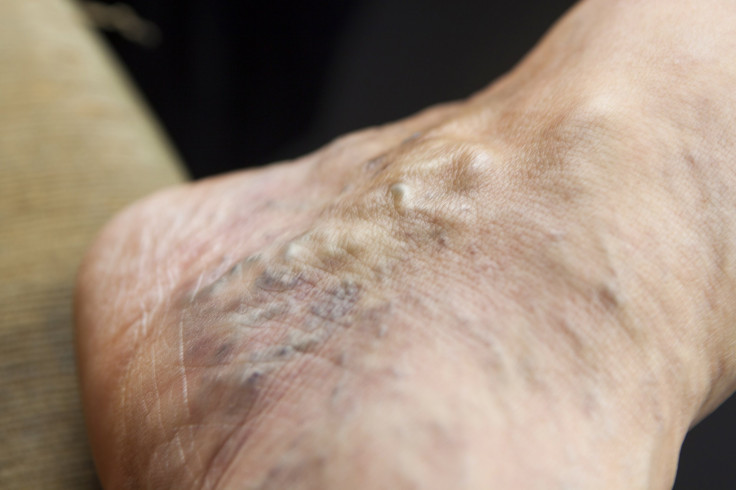Varicose Veins From Sitting Cross-Legged? Plus Other Potential Causes

Chances are if you don’t have varicose veins, you anticipate somewhat one day developing them. There’s a lot of false information surrounding how you really get those visible purple veins, as well as some crazy myths on how to prevent them from ever becoming a part of your life. It’s time to set the record straight and separate fact from fiction in the vein game.
What Are Varicose Veins?
Veins help to carry fresh blood from our hearts to the rest of our body. According to the National Heart, Lung, and Blood Institute (NHLBI), when these veins become weak or damaged the blood can back up and pool in the veins. This creates pressure in the veins and, subsequently, will cause them to swell, often producing varicose veins. These veins can sometimes cause discomfort and, in extreme cases, require medical attention. But if you personally live with varicose veins, you're not alone. ABC News reported that more than 40 million Americans are living with the condition. Although varicose veins are most commonly found in the legs, ankles, and feet, they are also somewhat common on the scrotum.
What Can Put You At Risk?
Genetics
Unfortunately, one of the biggest contributing factors to whether or not one will develop varicose veins is genetics. According to the NHLBI, over half of all people who have varicose veins have a family history of the condition. In 2011, a German study identified a single protein, AP-1, triggers the production of several molecules that promote stretching of the vessel walls. Chances are if someone in your immediate family has these veins, you are already predisposed to develop them yourself at some point.
Being Pregnant Or Overweight
Because these veins are caused by pressure, the extra weight of pregnancy or obesity can be a large factor. Thankfully, according to the NHLBI, varicose veins caused by the extra strain of pregnancy usually get better within three to 12 months after delivery.
Being generally overweight is a risk factor for developing varicose veins for the same reason as pregnancy, but unfortunately this pressure usually lasts for longer than nine months.
Does Crossing Your Legs Cause Varicose Veins?
No. Vascular surgeon Dr. John Modrall told the University of Arkansas that this old wives' tale is nothing more than an urban legend. "Crossing your legs does not cause varicose veins," he said. "They result from an intrinsic problem with the veins themselves."
While the veins are caused and then further exacerbated by pressure, the pressure from crossing one’s legs is minimal and not likely to cause any noticeable changes.
What About Standing?
Unfortunately, standing has been suspected of not causing varicose veins but perhaps exacerbating the appearance of those which already exist. This is because it can cause blood to pool in the veins, which once again increases the pressure. John Hopkins Medicine also listed sitting too long as an equal contributor to the condition.
Overall, it’s recommended that people achieve a sufficient amount of physical activity, since staying in one position for a long period of time prevents the blood from flowing well. This may force your veins to work harder to pump blood to your heart, and thus increase their chances of weakening.
Can You Prevent Varicose Veins?
Items such as tight clothing and high-heeled shoes, the NHLBI says, contributes to the worsening of varicose veins, and those who already have these veins or are believed to be at a genetic disposition of developing them, may be advised to reduce how much they wear such items.
No matter how often you cross your legs, how little you sit, and how much you exercise, you can’t prevent the onset of varicose veins. In those who are predisposed to the veins, however, there are ways to slow down their eventual appearance.
Dr. Luis Navarro of the Vein Treatment Center told Beauty World News that although these veins are generally hereditary, “certain lifestyle factors can increase the probability of veins appearing.” Navarro cited running as one of these lifestyle factors. Running actually helps to prevent varicose veins, as the activity improves venous circulation.”
If you have varicose veins or know that they run in your family, there is nothing to fear. This condition is extremely common, and a doctor may simply ask you to make minor lifestyle changes to prevent them from worsening. In the end, however, maintaining an overall healthy weight and any type of regular exercise will help to slow and reduce the onset of these veins.



























